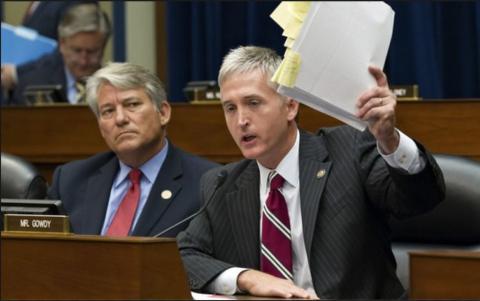Wingnut Republicans seem intent on electing Hillary Clinton president of the United States. That is the only conclusion that can be drawn from the embarrassing Benghazi committee hearings, which provided wall-to-wall positive media and a day of free airtime for the former secretary of state.
Congressional Republicans shooting themselves in the foot isn’t new. What’s tragic about the Benghazi hearings is that they displace the serious inquiries that we desperately need about the direction of our foreign policy.
The United States invaded Iraq more than a decade ago. The assault — with costs including nearly 4,500 U.S. soldiers killed and more than $2 trillion and counting — destabilized the entire region. The Islamic State grew in the ruins. No viable government has been created, and U.S. troops are going back in. We went after Osama bin Laden in Afghanistan over a decade ago. Now Osama bin Laden is dead, but somehow the United States is becoming the guarantor of an Afghanistan government that can’t defend itself despite billions of dollars’ worth of arms and training. Obama now concedes that 5,500 troops or more will be staying on guard.
We joined with allies to topple Moammar Gaddafi in Libya, and now the situation has descended into chaos. We backed the Saudi assault on Yemen and are wrecking havoc there. We announced that Bashar al-Assad must go in Syria, and now are fighting against both the regime and its leading enemy, the Islamic State.
President Obama was committed to bringing the endless war on terror to an end, on removing troops from Iraq and Afghanistan, and operating a foreign policy under law. He has retreated from all those goals.
Worse, the United States has assumed, with little debate, the role of policing the world. We’re challenging Vladimir Putin in Ukraine and dispatching troops in exercises in the Baltics. We’ve deployed ships and troops to the Gulf. We’re “pivoting” to Asia, with the Navy gearing up to challenge China’s claims in the South China Sea. We’re maintaining an estimated 800 bases and outposts strewn across the world. In 2015, U.S. Special Operations forces deployed to 147 countries, more than twice the number in the last years of the Bush administration. On any given day, these soldiers can be found in more than 70 countries.
As a nation, we are in dire need of a thoughtful reassessment of U.S. national security priorities and a critical review of the militarization of our foreign policy. What are our true security priorities? What are our strategy and interests in the conflicting currents of the Middle East? U.S. interventions in Iraq, Libya, Syria and Yemen have left chaos and failed states in their wake. Since our inability to do nation building is repeatedly demonstrated, why is that routinely ignored in each successive crisis?
Washington has always featured intense partisan struggles. But it isn’t false nostalgia to remember that in the past, congressional leaders were prepared to put the nation first, at least some of the time. The Watergate Committee witnessed fierce partisan spats, but also bipartisan efforts to find the truth. The Church Committee hearings probed the record of covert actions and excessive domestic spying, producing positive reforms. Sen. J. William Fulbright (D-Ark.), as chairman of the Senate Foreign Relations Committee in the 1960s, challenged the policies of his fellow Democrat, President Lyndon Johnson, in hearings on U.S. foreign policy and the intervention in Vietnam that helped bring a reassessment of that folly. Rather than pursuing Clinton down an e-mail rabbit hole, a special committee inquiry that focused on what we need to learn from this dismal record of intervention would surely have been more important to the nation.
The United States remains the only country that can project military force across the world. Yet our record of military intervention is one of repeated and costly failure. Despite this, politicians in both parties bray for more muscular policies. Republican conservatives have abandoned the wisdom of Eisenhower, and the realism of former secretary of state James Baker, to embrace the military fantasies of the armchair neoconservative warriors. Establishment Democrats boast about the “indispensable nation” and promote “humanitarian” intervention across the world. Our military is permanently engaged; our wars endless. If our budget priorities, as the saying goes, are the best measure of our values, then the Pentagon captures our heart.
Yet there is virtually no debate — beyond that of mudslinging — on the failed interventions and permanent empire of bases that burden our foreign policy. This should be a centerpiece of serious congressional inquiry and clarifying presidential campaign debate. Surely it is time to challenge a global overreach that, embraced by both parties, has failed repeatedly in the past and seems doomed to fail in the future.
Katrina vanden Heuvel is editor and publisher of the Nation magazine. She writes a weekly column for The Post. Read more from Katrina vanden Heuvel’s archive or follow her on Twitter.


Spread the word